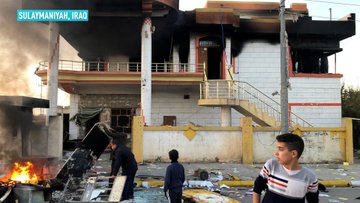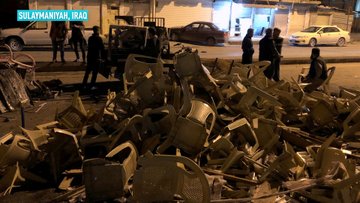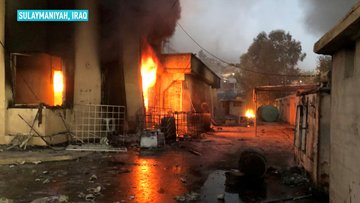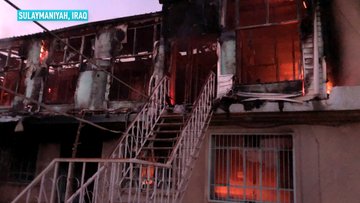This is C.I.'s "Iraq snapshot:"
Thursday, December 10, 2020. Protests continue in Iraq and more and more notice how little coverage western journalism provides.
Western troops (including US troops) are not popular in Iraq. More and more, the same is true of western reporters. John Davison of REUTERS Tweeted:
Under 200 words and dateline is Baghdad. Reuters couldn't send their Erbil correspondent to Suleimaniyah to do some actual reporting?
“Reuters couldn't send their Erbil correspondent to Suleimaniyah to do some actual reporting?” They might be at standby to be called to go to Nasiriyah anytime to do actual reporting!
What's going on? People are fed up with so-called reporters. A western reporter has far more protection in Iraq than does an Iraqi reporter. No one has, for example, broken into the home/hotel room of a western reporter in Baghdad and killed them. The same can't be said of Iraqi reporters. Hadi al-Mahdi is only the best known example of an Iraqi reporter killed in their own home -- and let's be honest, outside of Iraq, few bothered to follow Hadi's case and few bother to remember him today. See the September 8, 2011 snapshot if you're late to Hadi's story.
I don't want to act as though western reporters don't face threats. Ned Parker was threatened on Iraqi television, AL-AHD (owned by the miliita Asaib Ahl al-Haq which is backed by the Iranian government) and not only did the Iraqi government do nothing about it, the sitting prime minister Hayder al-Abadi mocked Ned. It gets worse, Hayder had the nerve to belittle Ned on American soil. (Barbara Slavin was one of the few journalists present to push back.) And certainly, Jill Carroll and others were targeted in the early years of the war (Carroll was kidnapped).
But in the last years? It's the Iraqi journalists risking everything to report on Iraq while the western reporters who have the backing of corporations refuse to report on the realities of Iraq. Maybe they're scared of being banned? Wouldn't that be better than to be, for example, Jane Arraf who has spent decades in Iraq and has nothing to show for it? Not one major storyline the whole time. That is, after all, how Jane got to stay in Iraq when Saddam Hussein was in charge and how she has been able to stay there for many, many years after.
The day a protester is killed with a tear gas canister -- it is shot at his head and kills him -- Jane's prattling on air on NPR about how restrained the security forces are -- they're just using tear gas and sonic bombs and --
Is that really going to be Jane's legacy? Decades in Iraq without ever breaking one meaningful story?
The western press didn't just go to Iraq to cover the war -- when they did go. No, they were also there to teach the Iraqi people about a free press. Surveying the western press today versus the Iraqi press, it appears it's the Iraqi reporters who have several things to teach western reporters, not the other way around.
THIRD's editorial "Editorial: When the press ignores violence" highlights Louisa Loveluck and Isaiah's THE WORLD TODAY JUST NUTS "Hardworking Louisa Loveluck."
Louisa, if you missed it, entered the conversation about the Nassiryah protests last week when people on Twitter were noting that western outlets were ignoring Moqtada al-Sadr sending his goons to attack the protesters. Not so, Lousia wanted people to know "for the record," she insisted, it was covered. She then listed four outlets: ALJAZEERA (not a western outlet, Louisa, how is that news to you?), AFP, AP and REUTERS. Lousia didn't mention THE WASHINGTON POST -- the paper she works for. She didn't mention it because they didn't cover it. And while Louisa's trying to push back, she didn't realize how lazy and entitled she came off -- she's not just a reporter for THE POST, she's the bureau chief . . . for Baghdad. Iraq is her beat. But she didn't protests on the dead and wounded and, when people were critizing the silence of the western press, she -- with no awareness or irony -- went on to list four outlets that she doesn't work at who covered the story while failing to own her own decision not to cover it -- or even to cop to it.
Hundreds of people protested in several towns across Iraq's Sulaimaniyah province on Wednesday, local sources told AFP, as rights organisations slammed the Kurdish authorities' targeting of peaceful demonstrators.
Protests against the Kurdish regional government (KRG) and the region's main parties broke out last week over a major fiscal crisis that has caused delayed public sector salaries and pay cuts.
After a tense morning across Sulaimaniyah province, there were protests in Dukkan, Rania, Darbandikhan, Piramagrun and Chamchamal on Wednesday evening, local residents told AFP.
In Chamchamal, around 300 young men gathered outside the local headquarters of the Kurdistan Democratic Party (KDP), the rival Patriotic Union of Kurdistan (PUK) and smaller parties, according to journalist Latif Fateh Faraj.
Khazan Jangiz (RUDAW) reports:
Fourteen members of the Kurdistan Region’s parliament on Wednesday said
they are protesting parliamentary meetings and sessions “to draw the
government's attention to the well-being of the people."
The MPs, made up of representatives from the Kurdistan Islamic Union
(KIU), Kurdistan Islamic Group (Komal or KIG) and Gorran (Change)
Movement gathered in front of parliament urging both parties and
protesters to refrain from violence.
“We call on all parties, in the cities and towns that are experiencing
tensions, to vacate their offices and refrain from confronting the
protesters, not to let the protests escalate,” said the MPs in a joint
statement read by Gorran MP Ashna Abdulla Qadir.
“We call on the protesters to take a peaceful approach to their rights …
and we urge them to refrain from violence and burning public places,
which are public property,” they added.
Halgurd Sherwani (KURDISTAN 24) notes:
The Kurdistan Regional Government (KRG) supports “peaceful and civilized” protests in the Kurdistan Region in a way that does not violate people’s freedom and rights, Prime Minister Masrour Barzani said on Wednesday during a press conference in Erbil.
“We support civilized and peaceful protests of the Kurdistan Region’s people,” the prime minister said during a press conference, addressing journalists on the latest developments and tensions the Kurdistan Region recently witnessed.
One way to support peaceful protests, it should be pointed out, is to stop Kurdish forces from attacking the peaceful protesters to begin with. Or is that concept too much for Barzani's mind? Barzani's called for the US to broker a deal between the Baghdad-based central government and the KRG regarding oil. Maybe he needs to call for someone to mediate between the KRG and the peaceful protesters? To ensure that the protesters are actually protested?
This is a really bad time for Barzani to being making mis-steps publicly. Elections are supposed to take place in June. Gorran benefitted from the PUK's inability to speak to the Kurdish people. Now it may be the KDP's turn. Think the PUK doesn't grasp that? Muwafaq Mohammed, Mohammed Tawfeeq and Aqeel Najim (CNN) note:
Iraqi President Barham Salih said authorities were watching the situation in the province with "deep concern," in a statement urging local officials to listen to protestors' demands. "Solving these problems with violence is a huge error," he said.
Salih is PUK, Barzani is KDP.
The Iraqi government and the Kurdistan Regional Government (KRG) are failing in their obligations under international and Iraqi law to bring to justice the “perpetrators of crimes” against journalists, activists, human rights defenders and protesters, eight Kurdish, Iraqi, and international watchdogs said in a joint statement on Wednesday (December 9).
“Despite repeated pledges by the authorities including Prime Minister Mustafa Al-Kadhimi to carry out investigations and hold perpetrators accountable, the authorities have failed to do so to date, in effect perpetuating and further entrenching decades of impunity that have left brave individuals without the most basic protection,” read the statement.
The organizations called on the federal government to investigate the detention of activists and others since the start of the 2019 protests and to free all those held “arbitrarily” for peaceful protests.
Yasmine Mosimann (RUDAW) reports:
Several international and local human rights groups on Wednesday urged
the Kurdistan Regional Government (KRG) and Iraq to end the arbitrary
detention of activists, civil society members, and peaceful protestors,
as demonstrations continue in the Kurdistan Region.
“The Iraqi government and the Kurdistan Regional Government are failing
in their obligations under international and Iraqi law to bring to
justice the perpetrators of crimes against journalists, activists, human
rights defenders and protesters,” reads a statement by six Iraqi rights organizations, as well as Amnesty International and Human Rights Watch (HRW).
The letter comes as tensions rise in the Kurdistan Region. Protests
began in Sulaimani city, started by civil servants who have gone unpaid
for much of this year amid budget disputes between the KRG in Erbil and
the federal government in Baghdad. Demonstrations have since spread to
other towns in the province, as well as in Halabja province and the
Garmiyan administration.
We focused on the KRG protests in the above but protests continue in Nassiriyah. THE BAGHDAD POST Tweets:
Today is International Human Rights Watch Day and the following statement was issued:
Eight organisations released the following statement today calling on the Iraqi government to investigate the detention of activists and others since the start of the 2019 protests and to free all those held arbitrarily for peaceful protests.
As we mark International Human Rights Day on 10 December, the undersigned organisations call on the Iraqi authorities to fairly, thoroughly and effectively conduct investigations into the cases of detention that have taken place since the start of the popular protests in October 2019 and the forcible disappearance and unlawful killings of dozens of Iraqi activists, journalists, lawyers, and other civil society members, to release those held arbitrarily in relation to their right to free speech or peaceful assembly, and to bring to justice all those responsible for these acts.
The undersigned organisations are especially concerned about the lack of accountability for the extrajudicial executions that have taken place this year, targeting individuals for their peaceful expression.
On 6 July 2020, four unidentified men on motorcycles fatally shot journalist and security expert Dr. Hisham Al-Hashemi in front of his house in the Zayouna area in the capital, Baghdad. Local sources confirmed that Dr. Al-Hashemi had received repeated threats in the weeks prior to his murder from members of armed groups due to his participation in various television programs, talking about the illegal activities of armed militias in Iraq.
On 15 November 2020, the Iraqi government stated that Al-Hashemi’s killers had fled the country after the authorities seized the motorcycles in Baghdad and identified two of the killers. A government spokesman told state television that “one party smuggled them outside the country,” without naming the party.
On 2 October 2020, seven United Nations experts issued a statement calling on Iraq to investigate the cases of two women human rights defenders targeted for assassination. In August 2020, unidentified gunmen murdered Riham Yaqoub, a doctor and activist who also advocated for the right of women to physically exercise in public spaces.
On 17 August 2020, Lodya Remon Albarti, a defender of women’s and environmental rights, was shot during an assassination attempt. “It is outrageous that women in Iraq have to risk or lose their life to defend human rights,” the UN experts said. “The impunity that allows these crimes to continue must end.”
In the Kurdistan Region of Iraq, local authorities have been targeting civil society activists by arresting them for their work and curtailing public freedoms, including media freedom and freedom of peaceful assembly, including since August 2020. Dozens of activists, teachers, and peaceful protesters have participated in protests to demand an end to corruption in the region, the improvement of public services, payment of salaries of employees that were delayed for months, and the implementation of comprehensive reforms. Although some have been released, many remain in detention.
The Iraqi government and the Kurdistan Regional Government are failing in their obligations under international and Iraqi law to bring to justice the perpetrators of crimes against journalists, activists, human rights defenders and protesters. Despite repeated pledges by the authorities including Prime Minister Mustafa Al–Kadhimi to carry out investigations and hold perpetrators accountable, the authorities have failed to do so to date, in effect perpetuating and further entrenching decades of impunity that have left brave individuals without the most basic protection.
Signed,
- Amnesty International (AI)
- FIDH, within the framework of the Observatory for the Protection of Human Rights Defenders
- Iraqi Network for Social Media (INSM)
- Iraqi Observatory for Human Rights (IOHR)
- Metro Center for Journalists' Rights and Advocacy
- World Organisation Against Torture (OMCT), within the framework of the Observatory for the Protection of Human Rights Defenders
New content at THIRD:
- Truest statement of the week
- Truest statement of the week II
- A note to our readers
- Editorial: When the press ignores violence
- TV: That disappointing flight attendant
- Music roundtable
- 10 condiments to dip raw carrots in
- True stories
- Tweet of the week
- This edition's playlist
- #TheJimmyDoreShow BREAKING: Hunter Biden Under Inv...
- Krystal Ball: CNN Business Reporter Shamelessly Co...
- Bernie Sanders: From Opposing the Deep State to Be...
- Highlights
The following sites updated:






